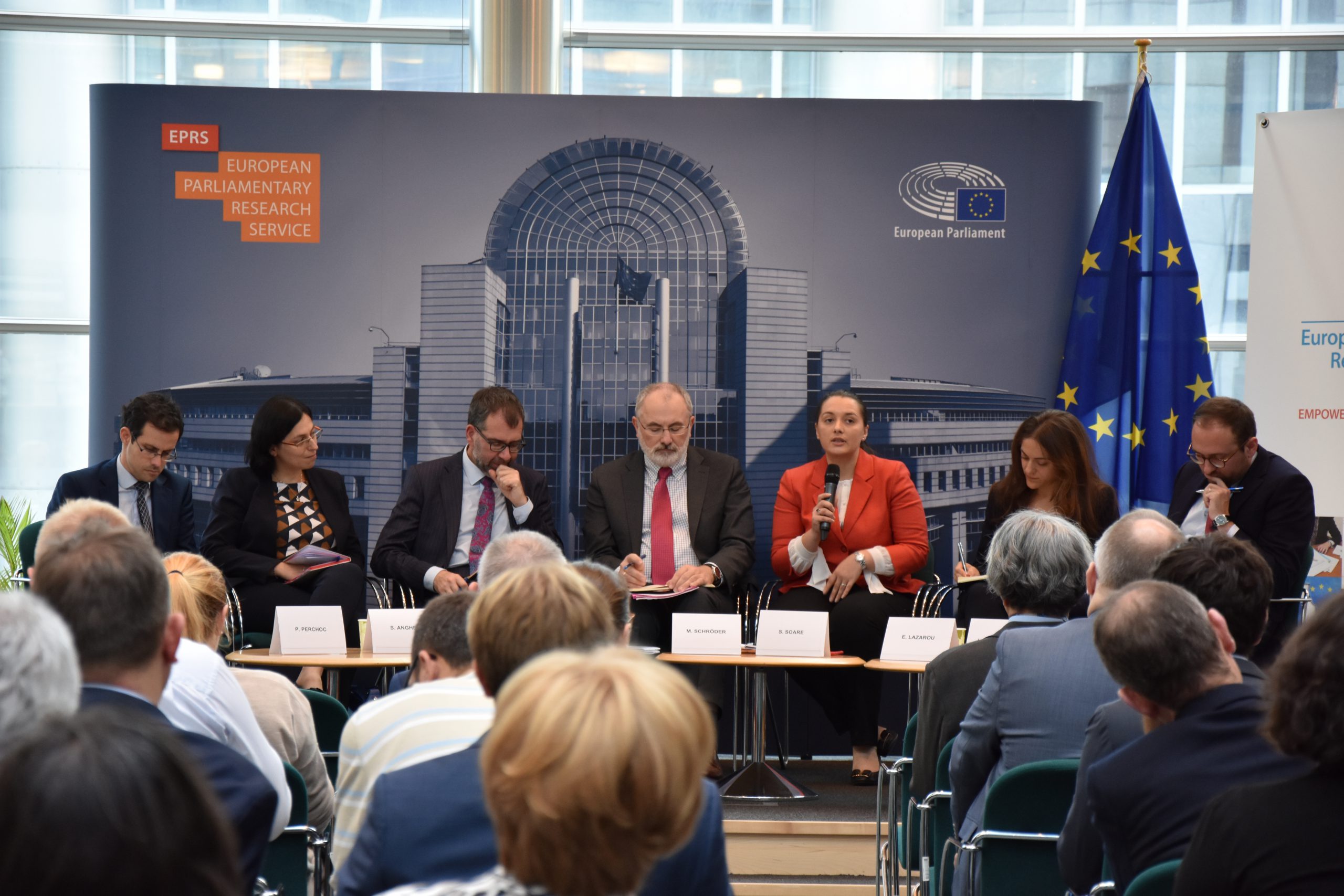Written by Elena Lazarou and Nicholas Lokker,
Maximilian Schroeder, Head of Unit of the Subcommittee on Security and Defence Secretariat, and Anthony Teasdale, Director General of EPRS, welcomed a panel of six experts to a briefing seminar on ‘Understanding CSDP: EU Common Security and Defence Policy’ on 2 October 2019.
 Sven Biscop of the Egmont – Royal Institute for International Relations focused his introductory remarks on leveraging the new common security and defence policy (CSDP) and defence industrial policy mechanisms into concrete capabilities. He stressed that instruments such as the European Defence Fund (EDF) and Permanent Structured Cooperation (PESCO) are not ends in themselves. Real success will require an emphasis on using these frameworks to develop projects that the EU would not otherwise undertake, instead of, according to the expert, becoming stuck in procedures, as is currently the case. He added that a particularly important goal for PESCO should be the integration of, as opposed to simple cooperation between, European militaries. Without this, the EU cannot achieve a ‘comprehensive, full spectrum force package’.
Sven Biscop of the Egmont – Royal Institute for International Relations focused his introductory remarks on leveraging the new common security and defence policy (CSDP) and defence industrial policy mechanisms into concrete capabilities. He stressed that instruments such as the European Defence Fund (EDF) and Permanent Structured Cooperation (PESCO) are not ends in themselves. Real success will require an emphasis on using these frameworks to develop projects that the EU would not otherwise undertake, instead of, according to the expert, becoming stuck in procedures, as is currently the case. He added that a particularly important goal for PESCO should be the integration of, as opposed to simple cooperation between, European militaries. Without this, the EU cannot achieve a ‘comprehensive, full spectrum force package’.
The next speaker was Simona Soare of the EU Institute for Security Studies, who proposed three principal areas for the Parliament to consider. First, echoing Sven Biscop, she urged Parliament to take stock of the EU’s credible progress on the CSDP since 2016, focusing on concrete outcomes of the instruments it has designed. Second, Parliament should look ahead and prioritise emerging digital and climate issues. Specifically, how can the EU position itself to push for appropriate norms around technologies such as artificial intelligence, and how will climate change affect conflict prevention? Finally, according to the speaker, Parliament must consider how to respond to changes occurring in fundamental pillars of the transatlantic relationship such as trade, multilateralism, and security cooperation.
 Defence has become a regular topic on European Council meeting agendas, the continued monitoring of which will be key to future implementation of CSDP initiatives. Suzanna Anghel Gavrilescu of the EPRS European Council Oversight Unit reminded the audience that the current discourse on defence is largely the result of consensus in the European Council since 2012-2013 that ‘defence matters’. However, she cautioned against expecting the Council to use vocabulary such as ‘European Defence Union’ or ‘strategic autonomy’ in its discourse regarding the CSDP.
Defence has become a regular topic on European Council meeting agendas, the continued monitoring of which will be key to future implementation of CSDP initiatives. Suzanna Anghel Gavrilescu of the EPRS European Council Oversight Unit reminded the audience that the current discourse on defence is largely the result of consensus in the European Council since 2012-2013 that ‘defence matters’. However, she cautioned against expecting the Council to use vocabulary such as ‘European Defence Union’ or ‘strategic autonomy’ in its discourse regarding the CSDP.
Elena Lazarou of the EPRS External Policies Unit outlined a few of the largest challenges to future EU security. The increasing rate of technological change is a major concern, which will only heighten the problem of delayed EU responses to global issues. If it cannot resolve this discrepancy, the EU will fall further and further behind. Additionally, the EU lacks a clear ‘grand strategy’. To guide its actions on CSDP, the EU must formulate a coherent vision of the strategic link between its various developing capabilities, possibly in the form of a White Book, as the European Parliament has repeatedly requested.
Continuing this discussion of large-scale changes to global security, Leopold Schmertzing of the EPRS Global Trends Unit noted that we first must recognise the increasing power of information in warfare, as actors weaponise narratives to gain the upper hand in conflicts. Additionally, digitisation means that artificial intelligence will be increasingly used on the battlefield. Finally, a few entities will control a majority of the military capabilities in a multipolar world, which will add new complexity and volatility to nuclear strategy.
 Wrapping up the discussion, Phillipe Perchoc of the EPRS External Policies Unit presented the new Normandy Index, developed by EPRS and the Institute for Economics and Peace, which measures threats to peace and democracy in the world. He emphasised that defence also includes peace protection, and that this index can therefore also be used as a tool for parliamentary work on the security and defence policy.
Wrapping up the discussion, Phillipe Perchoc of the EPRS External Policies Unit presented the new Normandy Index, developed by EPRS and the Institute for Economics and Peace, which measures threats to peace and democracy in the world. He emphasised that defence also includes peace protection, and that this index can therefore also be used as a tool for parliamentary work on the security and defence policy.
Overall, the members of the panel agreed that the new structure proposed for the European Commission suggests that there will be continuity of previous Commission efforts in this field, with an increased emphasis on industrial and technological aspects. During a Q&A session with the audience, the panel addressed cooperation efforts between the EU and NATO, approaches for investing in and retaining human capital, as well as the role of Parliament in shaping CSDP and the future of the EU defence industry.








[…] Source Article from https://epthinktank.eu/2019/10/22/understanding-eu-security-and-defence-policy/ […]